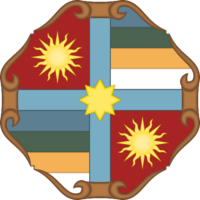Politics of Freice
 |
|---|
| This article is part of a series on the politics and government of Freice |
Since the 2021 Freician coup d'état, the politics of the Country of Freice (commonly known as Freice) takes place in the framework of a single-party socialist republic. Under the interim constitution of 2021, the sole legal party is the Common Wealth Party of Freice (Kpp), which is described as the 'preeminent movement for political, social, and cultural activities' in Freice. As a consequence of the Kpp's constitutional position, the party's leadership and the national leadership largely overlap. The incumbent First Secretary of the Kpp, Rarje Nemjiesa, is the current Leader of the Senior Council - the head of state and government in Freice.
Executive power is exercised by the government of Freice - the Senior Council - whilst legislative power is exercised by the Nuejel, elected every three years. The Senior Council is headed by a Leader, who serves as 'first amongst equals' alongside the heads of the individual government departments. Because the Leader is always the Kpp's First Secretary, in reality, the Leader is superior and not equal to other members of the Council, enjoying the power to appoint and dismiss members at his discretion. The judiciary is officially independent of the executive and legislative branches, but falls under the influence of the Kpp, rendering it de facto under state control.
Freice's political system is widely regarded by outside observers as undemocratic and authoritarian; political opposition to the authority of the Kpp is prohibited, and censorship is widespread. Freedom of the media is largely curtailed, with the media largely adopting and promoting the interests of the party. Elections are held in Freice, but candidates must be approved by the Kpp, with no real choice for voters.
Executive
The Leader of the Senior Council (Freician: Uenejal gi gura derjadia rajia) is the head of state and head of government, elected by the Nuejel every three years. In reality, the Leader, as First Secretary of the Kpp's Organising Committee, is elected by the Congress of the Kpp and approved by the Nuejel. This approval is largely symbolic. The Leader appoints and dismisses members of the Senior Council, and nominates candidates for the judiciary for the Nuejel's approval. The Leader has significant influence over both foreign and domestic policy, enjoying the right to declare war and peace and a state of emergency.
The Senior Council (Freician: Derjadia rajia) is the executive arm of the Nuejel, headed by the Leader and consists of a Deputy Leader and Councillors, who work for the implementation of the political, economic, social, cultural, and other such activities of the state. It directs the activities of the state, overseas the management of the country's finances, and ensures the effectiveness of the administrative structure and bureaucracy. The Senior Council is appointed by the Leader and can only be removed by the Leader.
Cabinet
As of July 2021, the makeup of the Senior Council (cabinet) is as follows:
| Cabinet of Rarje Nemjiesa (2021-present) | ||||
| Leader of the Senior Council | Common Wealth Party | Rarje Nemjiesa | 2021-present | |
| Deputy Leader of the Senior Council | Common Wealth Party | Tuse Gajal | 2021-present | |
| Councillor for Neighbourhoods, Strategic Relationships
and Cultural Services |
Common Wealth Party | Gera Ieja Yurjal | 2021-present | |
| Councillor for Communities, Planning and the Economy | Common Wealth Party | Amje Naqesal | 2021-present | |
| Councillor for Families, Education and Skills | Common Wealth Party | Jeke Qaga | 2021-present | |
| Councillor for Public Health, Social Care and Wellbeing | Common Wealth Party | Dr. Kuta Nedja | 2021-present | |
| Councillor for Conservation, Land Protection and Resources | Common Wealth Party | Ina Qiguqu | 2021-present | |
Legislative branch
Legislative power is vested in the unicameral Nuejel of Freice (literally 'Meeting'), which is composed of 13 members (or 'delegates') elected every three years via popular vote. All members of the Nuejel are members of the Kpp and need to be approved by the party leadership in order to stand as candidates. The Nuejel is headed by a Presiding Officer, who manages the business of the legislature and oversees its sessions..
Delegates are elected in four multi-member constituencies; each region constitutes one constituency that each return a specified number of delegates. Each region is allocated a number of delegates according to its population. Currently, the allocation of constituencies is: Northwest: 3; Northeast: 2, Southeast: 4; Southwest 4. Any number of pre-approved candidates can stand, with the candidates receiving the most votes elected according to the number of seats available. Delegates can be recalled at any time if ten percent of the electorate signs a recall petition. Candidates are elected as one group; if a recall petition passes, all must stand for election.
Legislation must pass the Nuejel in order to become law. In most cases, a simple majority (50%+1) is required, although amendments to the constitution require a two-thirds majority (66.6%+1) to pass. In 7 members (excluding the Presiding Officer) are required in order for a quorum to be reached and for business to be conducted.
Composition
The current membership of the Nuejel is as follows:
| Northwest | Pijal Biraqu, Arjal Baju and Bojida Tiqeqal | Common Wealth Party | 2021-present | |
| Northeast | Tenel Iedel and Pete Kiarja | Common Wealth Party | 2021-present | |
| Southeast | Iqe Tunia, Barjia Odiege, Kane Bijona and Kemue Bosa | Common Wealth Party | 2021-present | |
| Southwest | Sone Tiekie, Siegi Pogikna, Imje Inigi Baji, Timi Enquja | Common Wealth Party | 2021-present |



